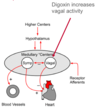13 - Drugs on the CVS Flashcards
What are some causes of arrhythmias?
Tachycardia: Ectopic pacemaker, afterdepolarisations, AF, re-entry loop
Bradycardia: sick sinus syndrome, drugs, AV block
What are the two different types of after depolarisations?
Delayed: if intracellular Ca high more likely to occur as reverses NCX and can lead to tachycardia
Early: depolarisation as recovery occuring, if AP prolonged (long QT)
EACH OF THESE CAN TRIGGER AN ACTION POTENTIAL

What is the rentrant mechanism of generating arrhythmias?
If you have multiple reentrant circuits you will get atrial fibrillation

What is AV nodal reentry?
Leads to tachycardia

What is ventricular pre-excitation?
Accessory pathway between atria and ventricles so impulse reaches ventricles earlier than it should so tachy
e.g Wolff-Parkinson-White syndrome

What are the four different classes of anti-arrhythmic drugs?

How do voltage-depend Na channel blockers prevent arrhythmia?
e. g Lidocaine
- They block depolarised tissue preventing automatic firing so A.P refractory period is longer, decreasing heart rate
- Damaged myocardium may be depolarised and fire automatically but these drugs stop this
- May give IV if patient has VT after MI to stop VF but not used prophylatically

How do B-adrenoreceptorr antagonists help treat arrhythmias and what are some examples?
- Atenolol, Propranolol
- Block sympathetic action. Decrease slope of pacemaker potential in SA and slow conduction at AV
- Stops SVTs

How do K+ channel blockers prevent arrhythmias?
- Prolong action potential, increasing absolute refractory period and heart rate but actually pro-arrythmic
- NOT VERY GOOD
What is the absolute refractory period of the ventricles corresponding with on the ECG?
- QT syndrome
- Longer QT can lead to torsades (ventricular tachycardia) which can turn into VF

What is the only K+ channel blocker that is used?
- Amiodarone as non selective to K+
- Treats tachycardia associated with reentry loop syndrome called Wolff-Parkinson-White
- Can supress ventricular arrhythmias post MI

How do Ca channel blockers prevent arrhythmias and what are some examples?
- Verapamil, diltiazem (Non-hydropyridines)
- Decrease slope of action potential at SAN, decrease AV nodal conduction and decreases force of contraction

How do dihydropyridine Ca channel blockers differ to nondihydropyridines?
Dihydropyridines act on vascular smooth muscle, e.g nifedipine, to act as anti-hypertensive
How does adenosine act as an anti-arrhytmic drug?
- Produced endogenously but can be given IV
- Act on A1 receptors at AV node (short half life)
- Enhances K+ conductance hyperpolarising cell
- Terminates reentry SVT

What is the definition of heart failure?
Chronic failure of the heart to provide sufficient output to meet the body’s requirements - can lead to peripheral and pulmonary oedema
What is an example of an ACE inhibitor, what is it used to treat in the heart, and how does it do this?
- Perindopril
- Treat hypertension and heart failure by inhibiting ACE
- Decreases vasomotor tone as angiotensin II is a vasoconstrictor
- Reduces afterload of heart
- Decrease fluid retention so decreased preload
REDUCING WORK LOAD OF THE HEART

What can you give a patient who cannot tolerate ACE inhibitors, e.g because of a cough?
- Losartan
- Angiotensin II receptor blocker so can be used for heart failure and hypertension

What can diuretics be used to treat?
- Heart failure and hypertension
- Mainly loop diuretics like furosemide in congestive heart failure to decrease blood volume and workload of heart
- In mild congestive heart disease thiazide diuretics

How can Ca channel blockers be used in the CVS apart from as an anti-arrhythmic?
- Dihydropyridines like nicardipine, nifedipine, amlodipine
- Decrease peripheral resistance, decrease arterial b.p, decreasing afterload and therefore workload
- Treat hypertension, angina, coronary artery spasm, SVTs

What are examples of positive inotropes and what do they do to the heart?
- They increase the contractility
- B1 agonists
- Cardiac glycosides
How do cardiac glycosides work on the heart and when would they be used?
- Improve symptoms of heart failure but not good in long run (horse anecdote)
- Positive inotrope and negative chronotrope
- Digoxin precursor
- Blocks Na/K ATPase so NCX reverses, increasing Ca in the cell, and therefore increasing force of contraction as more Ca stored in SER
- Increase vagal activity slowing AV conduction and heart rate so can be used in heart failure when arrhythmia

How do B agonists act as positive inotropes?
- Dobutamine selective B1
- Stimulates receptors at SA, AV and myocytes
- Used in acute but reversible heart failure (e.g after surgery) or in cardiogenic shock

What are the best and worst drugs to treat heart failure?
Worst: Cardiac glycosides and B agonists as they increase workload of heart whilst increasing cardiac output
Best: ACE inhibitors, ARBs, diuretics, beta blockers

When does angina occur?
When the O2 supply to the heart does not meet the demand, usually due to ischemia with no death of myocytes











